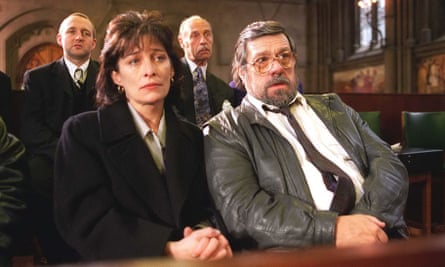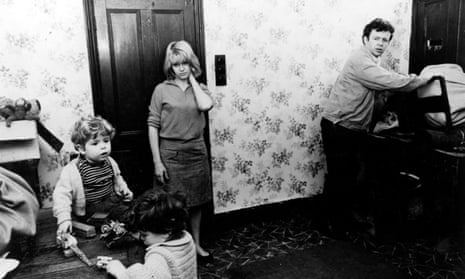Even in a time of escalating catch-up possibilities, most TV rapidly vanishes. So it’s impressive that a single play screened almost 50 years ago still has enough name- recognition to feature in a front-page headline in this paper this week, when the film director Ken Loach suggested that the position of the poorest in Britain may be worse than when, in 1966, he directed Cathy Come Home, Jeremy Sandford’s BBC drama about unemployment and homelessness.
The social and political impact of Cathy Come Home has become somewhat exaggerated in the popular imagination, with the common suggestion that the housing charity Shelter, which started shortly afterwards, was a direct consequence of transmission.
In fact, that organisation had already been preparing to launch, although Shelter – and Crisis, another charity set up the following year – doubtless benefitted from the parliamentary debate and raised awareness of disadvantage that were a consequence of the drama. And, while Loach and the play’s producer Tony Garnett are careful to stress that Cathy Come Home had more rhetorical than economic impact on the problems shown, it’s to their credit that the title alone still retains enough resonance to be used as shorthand for scandals of inequality.
The durability of 75 minutes of television from five decades ago also, though, raises the question of whether any piece of drama could kick up such a lasting fuss today. Those who believe that publicly influential pieces are a thing of the past might cite the fact that almost all of the dramas that achieved an effect anywhere close to that of Cathy Come Home are to be found in the archives, although two of them – Peter Watkins’s The War Game (1965) and Mick Jackson’s Threads (1984), Cold War what-ifs about the prospect of nuclear conflict – have just become available for purchase from the BBC’s new on-line shop, BBC Store. This creates the irony, in the case of The War Game, of the BBC now selling a show that it refused to give away for free during the two decades that Watkins’s fantasy of global conflagration was banned from transmission, due to fears that it might be too terrifying for viewers.
Beyond the controversies that both films caused – The War Game was eventually screened in 1985 in a season that included a repeat of Jackson’s later companion piece – it’s impossible to judge the historical repercussions of the dramas: Armageddon didn’t happen, but might not have happened anyway.

A post-Cathy play that had a measurable effect on the realm was the docu-drama Who Bombed Birmingham? (ITV, 1990), which publicised the plight of the six men wrongly convicted of an IRA atrocity, and was followed, a year later, by exoneration and compensation from the court of appeal.
Two other plays that can claim to have judicial influence were both written by Jimmy McGovern: Hillsborough (ITV, 1996) and Sunday (Channel 4, 2002). The former helped to build the momentum that led to various official inquiries into the deaths of 96 football supporters at an FA Cup semi-final in 1989, including a new inquest that is still in progress.
When Sunday was shown, Lord Saville was already a third of the way through his 12-year investigation into the killing of 14 civil rights protestors by British soldiers during a confrontation in Derry in 1972, but McGovern’s play significantly increased knowledge of the contested events, in concert with Paul Greengrass’s similar ITV project Bloody Sunday, shown on British television in the same week.
In this respect, another distinction of Where Cathy Come Home among TV’s campaigning fictions is that it dramatised a situation that was happening, as opposed to a warning about the future – the two films about atomic apocalypse – or an excavation of the past: the films about the deaths in Hillsborough and Derry.
So do such government-nudging plays still get made? Pessimistic veterans of the medium will note that all of the above examples are one-off dramas, broadcast in anthology series such as The Wednesday Play (which housed Cathy Come Home), Play for Today or high-profile one-off spaces cleared in the commercial schedule. Today, such plays, which encouraged the treatment of a single topic in a manner that was often polemical, have almost disappeared because of the fashion for multi-part series that will usually feature cops or docs in some form. These dramas can tackle contentious issues – such as domestic violence, child abuse or euthanasia – but none directly challenges establishment values and practices in the way that Loach, Garnett and Sandford did.
Certainly, it seems impossible to imagine that the BBC might make now a peak-time single play – Cathy Goes to the Food Bank, perhaps – about a victim of cuts to benefits or reduced local council provision. Executives simply would not – and, from a tactical standpoint, probably should not – risk the hostile reaction from a government with which the corporation is currently renegotiating its future, or the accusations of bias that would flow from those newspapers that regard the BBC as an overmighty media rival and enemy.

This is not to suggest that the BBC had greater political independence in the 1960s – a prime minister of the period, Harold Wilson, effectively removed both a chairman and a director general on ideological grounds – but there was greater internal and external appetite at that time for issue-led dramas. It is striking that Who Bombed Birmingham?, Sunday and Bloody Sunday were all made outside the BBC.
In recent times, the closest the broadcaster has come to bringing another Cathy home were Dominic Savage’s Freefall (BBC2, 2009) – which retrospectively explored the human damage from the reckless expansion of the mortgage market – and another work by the most stubborn practitioner of the dramatic polemic, Jimmy McGovern. His Common (BBC1, 2014) fictionalised one of several actual British cases in which the legal principle of joint or common enterprise was used to secure convictions for murder of those who had not been directly involved in the fatal incident.
Earlier this year, the court of appeal over-ruled one such sentence. The judiciary would surely deny that a play had influenced this decision, but television would cite the instance as evidence that, so long after Cathy Come Home, the medium can still prick conscience and consciousness.

Comments (…)
Sign in or create your Guardian account to join the discussion